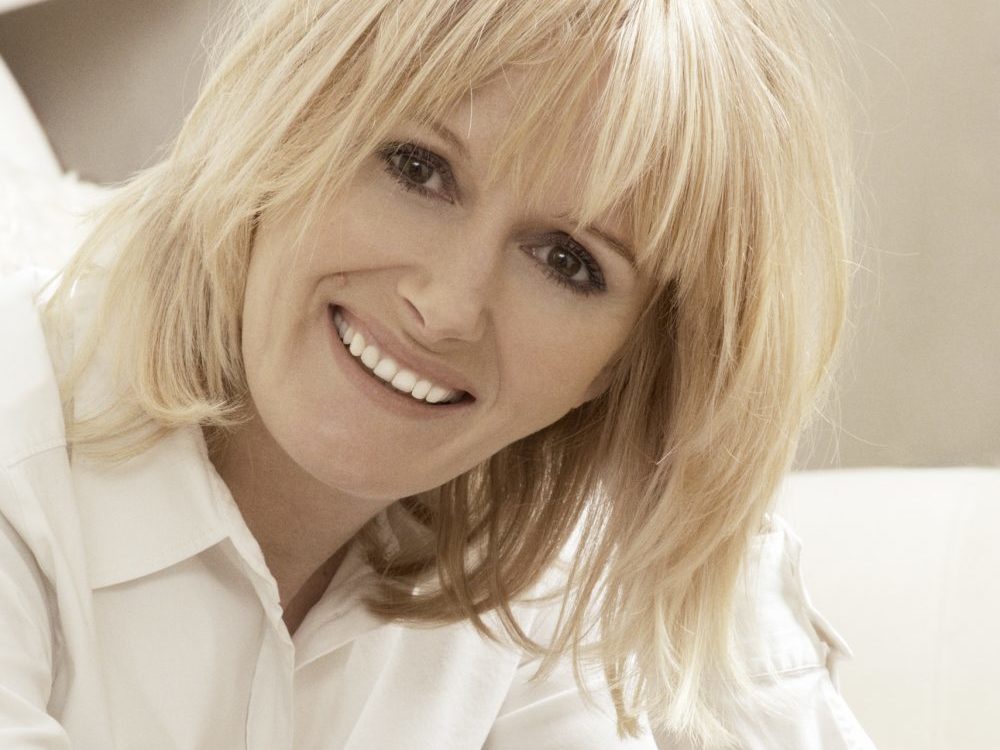First of all Jane, tell me what clothes mean to you these days. Do you still take great joy from fashion?
I do, and I love them most of all for their transformational nature. You can really portray yourself as whoever you want to be with clothes, depending on your mood, on whether you have to impress someone, or which aspect of your character you want to show. I remember as a child dressing up, that magic in being able to change who you are through your clothes. You can use fashion almost as an armour against the world, to make you feel more powerful, or to make you feel more approachable by dressing down. I love, as well, that the business is changing all the time. There’s always something new and different happening, and that is fascinating to watch, looking at the signals and trying to work out what’s coming next.
You’ve had huge success throughout your career, not just with Topshop, but with Whistles and a host of other businesses. How much of that do you think comes from the fact you are a woman dressing women?
I think it’s definitely an advantage. It is an interesting one, because most fashion designers are actually men, certainly of the big luxury brands, but I think most of the high street brands, at least for womenswear, have women at the helm. Interestingly, the designers that I like or wear the most are women – Miuccia Prada, Stella McCartney, Phoebe Philo – and maybe that is because they understand that a lot of us want this sort of effortless way of dressing that is contemporary and modern, but has an ease about it. Perhaps men design more for a fantasy of a woman – or maybe that’s a huge generalisation! But I think, from my point of view certainly, I can use a lot of those feelings I have about how I dress to dress other women. In that sense, why wouldn’t it be an advantage?
We met recently at an event for the charity SmartWorks, and you spoke about the importance of portraying confidence, even when you don’t feel it, of taking a kind of fake it ’til you make it approach…
I’m a firm believer in that, in pretending that you’re confident. Because when you do that, not only will people see you as more confident but I think it kind of rubs off a bit and actually makes it so. I think lack of confidence is something that women tend to suffer from more than men do, and I’m a real believer in just pretending otherwise and putting yourself out there.
Hearing you say that really struck me, as you don’t seem like someone who lacks confidence…
Doesn’t everybody? I think it’s universal, at some points in our lives. OK, I’m probably more confident than a lot of people, and I put that down to having very, very supportive feminist parents. Going to an all-girls school probably helped that in a way too, and then ending up in the fashion industry where I was surrounded by a lot of women. In that sense, life was probably easy for me and I was more confident from an early age. But of course I lack confidence at times. Life is hard. Throughout my career, I’ve had to appear to be super-confident and know exactly where I’m going, and a lot of the time when you’re running a big business, people are relying on you to lead and to tell them which way to go. When people are need your direction, you have to pretend you’re feeling confident even when you’re not, and hope that you’ve got it right.
You told me the last time we met that you weren’t really aware of feminism growing up, you just weren’t aware of an alternative…
Yes, absolutely. Which seems bizarre really, doesn’t it? But I guess I didn’t encounter anything to the contrary at home or at school, so it was only later on really that I thought ‘hang on a minute, this is not fair really’. But I guess it took me a while to realise that there was so much sexism out there. And maybe that made me better equipped to deal with it. I was more self-assured, perhaps, because I’d never really encountered otherwise.
You left Arcadia Group and Topshop after Philip Green’s takeover, and you’ve since spoken out about the bullying atmosphere he brought with him to the business. Were you aware of the scale of his abuse of employees when you left?
I mean, I knew he was a bully. Everyone knew he was a bully. The journalists, the city, everyone, because he bullied everybody regardless of who they were. I didn’t know about the sexual abuse side of it at all, but to be honest, when I was there and he owned Arcadia, I very much kept my team away from him because I didn’t really want him getting to be a part of Topshop. We were doing a good job ourselves and I didn’t really want him getting involved in any way. So, we were sort of protected from that. So, I’m kind of surprised, but also not surprised, by the sexual abuse side of things. A bully is someone who abuses their power, as is someone who sexually abuses – it’s all about power, and he has a lot of it – so it’s probably not all that surprising really.
You’ve since said that, while you’re not proud to admit it, you bullied him back a bit at the time. What did you mean by that, and do you think that was the right approach?
I don’t know, really. All I knew at the time was that bullies are usually people who on the inside are quite weak and, if you stand up to them, they’ll back down. I’ve tried that with various people and it seems to have worked, so I’d sort of work myself up into a bit of a state, shout and slam my fists on the table and basically mirror his behaviour. And yes, it appeared to work very well. But equally, I was in a position of strength because Topshop was doing really well at the time and the rest of his business wasn’t, so it was much easier for me to be effective in shouting him down than it was for most people. But, you know, it’s not fun doing that. It’s very draining after a while, and when you start having to behave like that, the writing is on the wall. It’s not a long-term strategy! You’d drive yourself mad.
How have you felt watching the bankruptcy of Topshop in the US and his attempts to save Arcadia recently?
I think there are two things strike me about it. Firstly there’s Phillip himself, contributing to his own downfall on a weekly basis, which is kind of not terribly surprising to me. But secondly, in terms of Topshop, it’s very sad. So much has happened, even in the last two years of retail though certainly in the last five years, that’s changed everything. I think the businesses that have survived are the ones that are really sharp and innovative, really looking for the next big thing and remaining really, really relevant to their consumers. And I think Topshop unfortunately just hasn’t really kept up. It’s probably rested on its laurels for too long and just found itself floundering a little bit, as so many other businesses have done. I think in a way you don’t expect, in fast fashion or on the high street, someone to be up there at the top for more than a ten-year period really, you expect people to be replaced simply because the nature of fashion is about newness and innovation. But I am very sad. I think it’s a real shame.
Could it have been different?
They were always going to be up against it, because I think the difficulty for bricks and mortar retailers in the digital age is that, as well as the cost of having shops and staff, they have to create a website as well. And while at the start, everybody thought having a website and selling online was really cheap, of course, it is not at all. It’s really expensive, because of the logistics around it and the fact that these days people expect free next day delivery and a very high level of service. So, I think all of those retailers who are doing both are fighting for their survival because they’re up against brands like ASOS, Boohoo and Pretty Little Thing who don’t have the cost of stores and staff so immediately are in a better position. But that said, you know, some retailers are surviving well. I think Next is an interesting case because it started as a catalogue business back in the day, so they’ve always known and mastered the logistics in a way that perhaps other bricks and mortar businesses haven’t done. And they’re still doing well. But I think all of the bricks and mortar businesses are suffering a little, and whether it’s Zara, H&M, & Other Stories, COS or Arket, they’re having a difficult time. Certainly not as difficult a time as Topshop is having, but they do face a
struggle to make it work in this new environment.
What strikes me in the Arcadia scenario is that we are once again talking about pensions. Of course all businesses exist to make money, there’s no use being naive about that, but there seems to be a lack of compassion or care for staff at the heart of a number of Arcadia’s business troubles…
I know, but I’m kind of surprised to that the people managing those pension funds hadn’t got a tighter grip and weren’t insisting that these funds be fulfilled or still viable. I’m very surprised by that. Because you see it happening once [at BHS] and you think that’s shocking, but to see it happening again? That just shouldn’t be the case. But you’re right, there’s a feeling of ‘how much money can I make out of this?’ at the forefront of it all. It seems to me there’s been a mismanagement at Arcadia, and at other businesses too.
Given all that is going on in bricks and mortar retail, it makes sense that you’re looking to move into the online field. Can you tell me much about your plans to launch a new business in online clothes rental?
What I’m trying to do is, in a sense, make up for my years of trying to make fashion compelling. I’ve recognised, all be it late, the incredible toll that fashion takes on the environment, and I’m trying to find some way of supporting a more sustainable way of enjoying fashion. I spent a long time looking at sustainable brands and wondered whether I could curate a kind of hub for sustainable brands, but at the end of that I wasn’t really happy with the design credentials of many of them, and I couldn’t find enough brands that were good enough. But then I thought, in the meantime, we’re still producing more stuff, so is there a better way doing it? And that’s when I started thinking about rental. Because I do love fashion and I think that if you can buy a piece, absolutely love it, and share it with 15 other people, then that strikes me as a better way of doing it. So that’s what I’m at the early stages of doing at the moment. I’m looking at a sort of peer-to-peer model, a platform through which people can either rent as individuals or as brands. A kind of DePop for rental I guess.
Depop is huge within a certain demographic. Do you think that is going to expand?
That’s getting broader all the time. The early adopters were, of course, the younger audience, the tweens I guess, but it seems to be gaining ground with all ages at the moment which is fascinating. I mean, you can search Jil Sander on Depop now and you’ll get hundreds of people selling beautiful things. But you know what’s so amazing about it is that it’s so quick. I decided to find out how quickly I could become a seller and it took me three minutes. It’s so fast, you just do it, and people don’t really care what the photographs look like. So people are making huge amounts of money. I know people who are selling on Depop and making a thousand pounds a week. It’s incredible.
What do you think are the key challenges with flipping that to a rental model?
I think the biggest thing is going to be getting people to consider renting their wardrobes. You need your lenders. I think getting renters will be relatively straightforward but getting the lenders could take longer, because I expect the early adopters will again be the younger crowd, 25 to 35 perhaps, and I’m guessing that generation generally doesn’t have a huge wardrobe, whereas the older customers might have the bigger wardrobes but be less happy to adapt to the idea of rental quickly. The route that we’re going down is really highlighting the fact that you can make your wardrobe work for you, to use your wardrobe as a business. I think that might be the key to capturing that audience, but it’ll take time. I fully believe that clothes rental is the future and will change people’s behaviour, which is great, but I don’t know who it will be that makes it successful. We’ll have a go, but it probably won’t be us. I think we have to try though.
You mentioned feeling you have to atone somewhat for your role in the creation of today’s fast fashion environment. Your approach was revolutionary at the time. Do you feel guilty about it now?
We didn’t create fast fashion, fast fashion has always been there. What we did at Topshop was we gave people access to a much better standard of product, which made the high street then become somewhere you could shop to find the latest designs and collaborations, as well as theatre in store and amazing service, which were all new things at the time. So, it wasn’t that we invented the model, that had been there for years. I think what we did was we raised the standard in a way that made it more exciting and more compelling. And in that sense, I know that we played our part in making more people buy on the high street and were, in a way, responsible. But, you know, that’s the way it goes.
We seem to be seeing a strange fashion dichotomy at the moment, with the high street becoming cheaper and more throwaway while the high-end brands become ever more expensive. What is driving that divergence?
Oh my god, yes, I don’t know what’s causing it, but I know I’ve noticed it myself. You used to be able to buy a pair of Prada trousers for £300 and now you’d be looking at a starting price of around £800. And I’m not talking about very long ago. I think what’s happened is that they’ve tried to make themselves more exclusive and they’ve also realised that they can actually sell product at those sorts of prices. Perhaps they’ve moved in that direction to provide a differential from the High Street. I’m not sure, but I agree with you, and I think it’s actually more difficult now to find something at that £200 to £300 price point of nice quality than it used to be. Of course, there are a few upper high street or bridge market brands – Maje, Sandro, Rixo, Kitri Studio, Ganni – in that space, but I think they’ve moved in precisely because the luxury designers have increased their prices and moved up.
It can be a minefield for shoppers who want to consume more ethically, because it’s not necessarily the case that the more you spend, the better the practices behind the product…
No, not at all, and I think at the moment that’s tough for people. I mean, I find it extremely difficult and I’m in the business and know roughly where people are sourcing from. I think that, in the same way as food labelling tells us where our produce comes from, how it got to us, whether it’s organic or not, retailers should have an obligation towards transparency.
But until that’s insisted upon by the government, that’s not going to happen. No one is going to do that for the sake of doing it, and in a lot of cases, retailers still want to keep their supply chains private because they feel that’s part of the value of the company so I think that plays into it. No one is finding a wonderful, ethical organic mill and immediately thinking, ‘Oh, I must share that information’. I think blockchain technology, which exists but is very expensive and very much in its infancy, will make a difference in time. Once that becomes the norm, people will be able to see where the yarn has come from, where the fabric has been made, where the actual garment production has taken place and in which factory. That is going to happen. But it’s going to take a while because it is very expensive, and most retailers currently can’t afford to be doing it.
Where do you shop now and what can consumers less educated than you be asking themselves when shopping?
Well, do you know what? I don’t know whether it’s because I’m in my fifties now but, while I still love fashion, I am much, much more conscientious. When I shop, I buy so much less than I used to, and when I’m going to buy something, I really examine the reasons for it – will I get good use from this? Am I going to wear it a lot? Am I going to wear it next year as well as this year? As an example, I bought a black Isabel Marant pirate shirt a couple of months ago and I’ve consistently worn it at least once or twice a week since I bought it. I’ll wear it throughout summer and I’ll wear it throughout winter, and it’s not so trend-driven that I’ll stop wearing it next year either. It’s quite standout, but in a way that is timeless. So, I think it’s about thinking really hard when you do make a purchase about whether you’re going to get the wear out of it. And then, if you really love something, great! Go for it. We can still love clothes and frankly, we’re not all going to walk around naked, so we still need them. I’m not suggesting people buy hair shirts and walk around looking like old hippies. I just think you should buy things that you really love, think more about it when you buy them, and buy them less often.
How big a mind shift has that been for you, that it’s ok to be repeatedly seen in the same things?
I think there are two tribes out there at the moment. I think there are a lot of people, particularly in my industry, who are feeling the same as me – namely, a little bit appalled by it. And then there’s generation Z who are becoming very concerned with the world’s resources and how we are using them. Equally, I think there are those who like to take pictures for Instagram that always feature something new. And I think if we can reach those people and push them towards renting instead then we’ll start to see a real difference.
You’re just back from travelling again, and you have taken a couple of breaks in your career, most notably your recent gap year. Do you think that willingness to walk away from work has had advantages? How does one avoid feeling that they have to stay on a set career path?
I’ve obviously been fortunate that I’ve been confident enough in my positions to feel I could walk away, but I think knowing you can do that does give you perspective. There’s a danger, otherwise, that you keep your head down, keep doing what you’re doing and fail to look around you and see what’s going on. Because when you do that, you also fail to see what makes you happy. You forget. I really love travelling, exploring and finding new places, and I think you have to give yourself the time and freedom to do that when you can, otherwise there’s a danger you end up just working and not really doing what makes you happy, what makes you feel alive. It’s important to have that balance I think.
How many of your decisions to walk away have been fuelled by falling out of love with what you’re doing, or losing that connection to yourself?
I think it’s about the challenges that were there at the start of something going away. When that happens, I feel that if I carry on, I’ll go a bit stale, and then it’s time to try something else. And I think that’s probably what drives it more than anything. A quest for something new, to reinvigorate. I’ve been so lucky in this industry to have worked with the most incredibly talented and creative young people, women mostly, who have made my life so enjoyable. That’s very important to me to find people that I love working with to develop new and exciting ideas.
Not everyone can turn on heel and leave a job that pays their mortgage. What should women be doing when they find themselves in the sort of untenable situation you did with Philip Green if they can’t just walk away?
Interestingly, I like to take advice from Mary Portas on this – everyone should read her book, Work Like a Woman, it’s actually really good. She says that if you’re feeling bullied or abused by somebody in the workplace but feel unable to bring it up yourself, talk to some of your other colleagues and see if they’re feeling it too, because the chances are you’re not alone. If two or three of you go in together to make a complaint about someone, that can often lend much more weight to your argument, so I think that’s really good advice. All too often when you have a bully in the workplace, that person could be bullying a number of different people but they’re each unaware of it, perhaps are ashamed of it, or think it’s only happening to them. And usually, it’s not.
When you had Mary on your podcast recently she was talking about, to paraphrase, the fact that when something doesn’t chime with your inner-frequency, it’s probably lost its ability to make you happy. Does that chime with you?
Very much so. When you can use your intuition and go with your gut feel, those are the times when work is most enjoyable, definitely. But intuition is a soft skill and something that’s very difficult to quantify. If you’re saying you really believe something is the right thing to do, often you’ll find people saying well, belief isn’t good enough. I think, especially in this data-driven world we live in now, simply saying you believe in something or feel something is right is becoming harder and harder to get people on board with. But we need to be able to trust that intuition, because I think we do our best work when we can.
Jane Shepherdson CBE is a patron of Smart Works, a charity that helps women back into work by supplying both working wardrobe items and professional interview coaching. Find out more at smarkworks.org.uk









